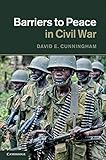Barriers to peace in civil war
Material type: TextPublication details: Cambridge ; Cambridge University Press, 2011Description: xiii, 282 p. : illISBN: 9781107007598 Subject(s): Peace-building | Peace | Civil warDDC classification: 303.64 Summary: "Civil wars vary greatly in their duration. This book argues that conflicts are longer when they involve more actors who can block agreement (veto players) and identifies specific problems that arise in multi-party bargaining. Quantitative analysis of over 200 civil wars since World War II reveals that conflicts with more of these actors last much longer than those with fewer. Detailed comparison of negotiations in Rwanda and Burundi demonstrates that multi-party negotiations present additional barriers to peace not found in two party conflicts. In addition, conflicts with more veto players produce more casualties, are more likely to involve genocide and are followed by shorter periods of peace. Because they present many barriers to peace, the international community has a poor track record of resolving multi-party conflicts. David Cunningham shows that resolution is possible in these wars if peace processes are designed to address the barriers that emerge in multi-party conflicts"--
TextPublication details: Cambridge ; Cambridge University Press, 2011Description: xiii, 282 p. : illISBN: 9781107007598 Subject(s): Peace-building | Peace | Civil warDDC classification: 303.64 Summary: "Civil wars vary greatly in their duration. This book argues that conflicts are longer when they involve more actors who can block agreement (veto players) and identifies specific problems that arise in multi-party bargaining. Quantitative analysis of over 200 civil wars since World War II reveals that conflicts with more of these actors last much longer than those with fewer. Detailed comparison of negotiations in Rwanda and Burundi demonstrates that multi-party negotiations present additional barriers to peace not found in two party conflicts. In addition, conflicts with more veto players produce more casualties, are more likely to involve genocide and are followed by shorter periods of peace. Because they present many barriers to peace, the international community has a poor track record of resolving multi-party conflicts. David Cunningham shows that resolution is possible in these wars if peace processes are designed to address the barriers that emerge in multi-party conflicts"--
| Item type | Current library | Collection | Call number | Status | Date due | Barcode |
|---|---|---|---|---|---|---|
 BK
BK
|
Kannur University Central Library Stack | Stack | 303.64 CUN/B (Browse shelf (Opens below)) | Available | 37417 |
"Civil wars vary greatly in their duration. This book argues that conflicts are longer when they involve more actors who can block agreement (veto players) and identifies specific problems that arise in multi-party bargaining. Quantitative analysis of over 200 civil wars since World War II reveals that conflicts with more of these actors last much longer than those with fewer. Detailed comparison of negotiations in Rwanda and Burundi demonstrates that multi-party negotiations present additional barriers to peace not found in two party conflicts. In addition, conflicts with more veto players produce more casualties, are more likely to involve genocide and are followed by shorter periods of peace. Because they present many barriers to peace, the international community has a poor track record of resolving multi-party conflicts. David Cunningham shows that resolution is possible in these wars if peace processes are designed to address the barriers that emerge in multi-party conflicts"--


There are no comments on this title.